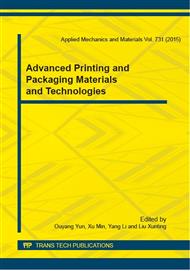p.365
p.369
p.374
p.381
p.385
p.389
p.395
p.401
p.407
Antimicrobial Effects of Cinnamon and Rosemary Essential Oils
Abstract:
The objectives of this study were to evaluate the antimicrobial efficacy of cinnamon essential oil (CEO) and rosemary essential oil (REO) against 4 food-related microorganisms. The chemical components of CEO and REO were also analyzed by GC/MS. The major active constituents of CEO were cinnamaldehyde (80.010%) and 2-methoxycinnamaldehyde (10.550%), and the major active constituents of REO were 1,8-Cineole (51.783%) and α-Pinene (13.508%).The antimicrobial results indicated that both them display strong inhibition against 4 strains. The combination showed additive efficacy against all tested microorganisms. Thus, our study demonstrated that CEO and REO can be considered potential alternatives to control pathogens and microbial in the food or food packaging material.
Info:
Periodical:
Pages:
385-388
DOI:
Citation:
Online since:
January 2015
Authors:
Keywords:
Price:
Сopyright:
© 2015 Trans Tech Publications Ltd. All Rights Reserved
Share:
Citation:


